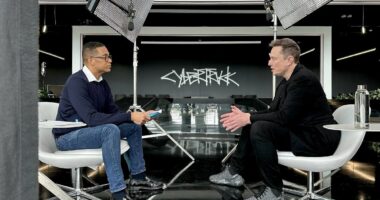Share this @internewscast.com
Exclusive images from DailyMail.com reveal Ashley St Clair, who is reportedly Elon Musk’s baby mama, leaving court smiling following her two-and-a-half-hour custody and paternity case against the billionaire.
In a surprising turn of events, Musk participated virtually in today’s court proceedings, shortly after stepping down from his role as a top adviser to Trump, in connection with a significant paternity and custody case.
St. Clair, 26, initiated the lawsuit on February 21, alleging that Musk instructed her to keep their child a secret, later cutting off communication during child support negotiations, which led her to pursue legal action.
DailyMail.com’s exclusive pictures show St. Clair, 26, as she strode into the hallway of part 44 in New York Supreme Court, flanked by her attorneys Dror Bikel and Karen B. Rosenthal.
The conservative influencer wore a long beige coat over a demure collared navy-blue knitted sweater and pleated skirt with white piping.
Her attorneys said ‘we are not going to speak to you’ as a reporter approached St. Clair.
The SpaceX and Tesla owner appeared on screen wearing a dark suit jacket, with his attorneys Alyssa Rower and Jennifer Isaacman present in court.
The world’s richest man, 53, appeared before Judge Jeffrey Pearlman, who then ordered the hearing sealed due to the sensitive nature of the proceedings.
Musk’s attorneys had previously successfully petitioned the judge to seal the case on March 14, keeping its details secret and limiting St. Clair’s ability to speak out.

Elon Musk’s alleged baby mama Ashley St Clair left court beaming after a two-and-a-half hour hearing of her custody and paternity lawsuit against the billionaire

Alleged ‘baby mama’ Ashley St. Clair, 26, arrived at court in Manhattan on Thursday for a paternity hearing regarding whether Elon Musk is the father of her child

Surprisingly, Musk made a surprise appearance virtually in the courtroom only hours after he had quit his position in DC at DOGE
The hearing comes on the heels of the tech boss abruptly announcing last night that he is quitting his role as a top government advisor to President Donald Trump after leading efforts to slash federal bureaucracy in the Department of Government Efficiency, also known as DOGE.
Musk – whose role in the administration was always intended to be temporary – said in a post on his social media site, X: ‘As my scheduled time as a Special Government Employee comes to an end, I would like to thank President @realDonaldTrump for the opportunity to reduce wasteful spending.
‘The @DOGE mission will only strengthen over time as it becomes a way of life throughout the government.’
St. Clair first went public in February, sensationally claiming in a shock post on X that the billionaire is the father of her baby boy, born in September last year.
She claims Musk contacted her via direct message in May 2023, and that the child, who has been named by his initials ‘R.S.C.’, was conceived early January 2024 on a trip to the island of Saint Barthélemy in the Caribbean.
Musk has not publicly acknowledged the child as his but has responded with cryptic emojis to posts on X about St. Clair’s claims.
DailyMail.com revealed in March how St. Clair had been forced to sell her $100,000 Tesla after Musk cut her child support in half.
She was spotted handing over the keys to her black Model S outside her Manhattan apartment.

DailyMail.com’s exclusive pictures show St. Clair as she strode into the hallway of part 44 in New York Supreme’s Court, flanked by her attorneys Dror Bikel and Karen B. Rosenthal

Musk’s attorneys had previously successfully petitioned the judge to seal the case on March 14, keeping its details secret and limiting St. Clair’s ability to speak out (PICTURED: Musk with his alleged son with St. Clair)


St. Clair filed the lawsuit on February 21 claiming Musk told her to keep the baby secret, then ghosted her and their son in the middle of child support negotiations, forcing her to take legal action

Sources told DailyMail.com that Musk’s behavior toward St. Clair has been ‘shocking and shameful’ after he cut her child support payments
She previously told DailyMail.com: ‘I need to make up the 60% cut that Elon made to our son’s child support.’
Asked if she felt Musk was being vindictive toward her, she said: ‘Well that’s his modus operandi, when women speak out.
‘You can check the stocks, I’m not the only one who is cleaning up his messes.’
St. Clair said the last time she tried to speak to Musk was February 13, but he did not respond.
A source close to the case previously told DailyMail.com that since St. Clair went public, Musk ‘retaliated’ by cutting her child support money in half ‘unilaterally’, leaving her struggling to make ends meet.
The source described the billionaire’s actions as ‘shocking and shameful’.
‘Ever since she got pregnant and then had the baby, Elon’s been providing support money to her,’ the source said. ‘But he had a fairly specific list of requirements, including not acknowledging he’s the father.
‘Since the moment she objected to the level of control he demanded, he’s withdrawn from her completely. When she went public with the fact that the baby was his, he’s never spoken to her again.

St. Clair also revealed she had been forced to sell her Tesla after the world’s richest man cut her child support in half

DailyMail.com witnessed her handing the $100,000 car over to a representative from the online auto sales giant Carvana in New York City over the weekend


The two went back and forth on X on March 31 arguing about the child’s paternity, with Elon airing out the cash he would send to her for the child

The new son with conservative influencer St. Clair would extend Musk’s brood to 13
‘When this thing went into court for custody and paternity, he cut the support payments way back. He cut it by more than half.
‘It’s a substantial reduction, and he obviously did it as a form of retaliation for her going into court,’ the source claimed.
DailyMail.com previously reported how St. Clair had been raising the toddler and her baby with another man with the help of a full-time nanny at her rented three-bed apartment in downtown Manhattan.
‘She bought a Tesla so she’d have a car to transport both the children in. Now she’s selling it because she needs to raise money to cover the expenses she has that Elon has simply not paid.
‘She’s been living on her own. She gets no logistics assistance from Elon. And all of a sudden, she’s punitively given much less money to raise this child than she’s ever had.’
‘The richest guy in the world, to treat a woman that he made a baby with this way, is shocking and shameful,’ the close source told DailyMail.com.















